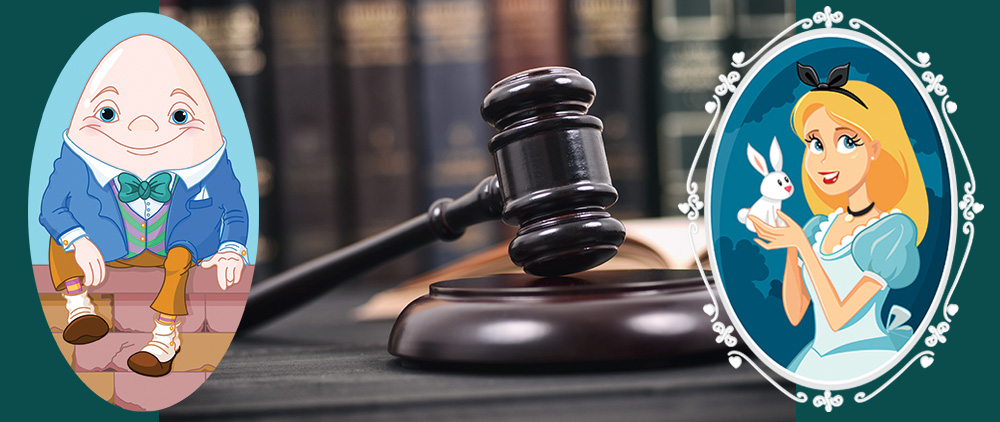Alice in Wonderland Meets Judge Humpty Dumpty in ‘Transgender’ Lawsuit
May 15, 2020 by David Fowler

Let’s look at an exchange between Alice and Humpty Dumpty, because it mirrors what is actually going on in this recent “transgender” lawsuit:
“I don’t know what you mean by ‘glory,’” Alice said.
Humpty Dumpty smiled contemptuously. “Of course you don't—till I tell you. I meant “there’s a nice knock-down argument for you!”
But “glory” doesn’t mean “a nice knock-down argument,” Alice objected.
“When I use a word,” Humpty Dumpty said in a rather scornful tone, “it means just what I choose it to mean—neither more nor less.”
“The question is,” said Alice, “whether you can make words mean different things.”
“No,” said Humpty Dumpty. “The question is which is to be master—that’s all.”
The point of this exchange from Lewis Carroll’s Through the Looking Glass is that whoever controls the words we use is the master.
As a friend of mine once wrote:
What the Judge SaidWords anchor a culture. They are the depository for the wisdom and observation of generations. A community is found, and its world is expressed, through its language. To destroy [that existing community] requires that its vocabulary be abducted. Chesterton—with reason—suggested that words are the only things worth fighting about. Nietzsche, partly right, wrote that unspeakably more depends on what things are called than on what they are.
Now that you get why words and redefining words are so important, you’ll appreciate what the judge in the “transgender” lawsuit said to Mr. Brooks, the attorney representing the biological females who were suing. The “intervenors” the judge references in the following quote are the biological males who now identify as females; they asked to intervene or join in the lawsuit Brooks brought against the state on behalf of the females.
Let me raise a point that undoubtedly will cause some consternation for you, Mr. Brooks, and your colleagues, but I exercise my prerogative as the presiding judge in this instance and I hope you will forgive me.
I don’t think we should be referring to the proposed intervenors as ‘male athletes.’ I understand that you prefer to use those words, but they’re very provocative, and I think needlessly so. (emphasis added)
Now read what the judge next said in light of what was earlier said about the importance of words and what they mean:
I don’t think that you surrender any legitimate interest or position if you refer to them as transgender females. That is what the case is about.
This isn’t a case involving males who have decided that they want to run in girls’ events. This is a case about girls who say that transgender girls should not be allowed to run in girls’ events.
So going forward, we will not refer to the proposed intervenors as ‘males’; understood?” (emphasis added)
There is much that could be said here, and I encourage you to ponder it. But here is my point: To the judge, the words “male” and “female” do not have the meaning they have had in our “community” in the past and that they have to Mr. Brooks.
Moreover, for Mr. Brooks to use the word “male” with its real, historical meaning is “needlessly provocative.” The judge is saying that what constitutes acceptable judicial decorum has now changed. In fact, the judge said so:
I’m not asking you to refer to these individuals as “females.” I know that you don’t want to do so. What I’m saying is you must refer to them as “transgender females” rather than as “males.” Again, that’s the more accurate terminology, and I think that it fully protects your client’s legitimate interests. Referring to these individuals as “transgender females” is consistent with science, common practice and perhaps human decency.
To refer to them as “males,” period, is not accurate, certainly not as accurate, and I think it’s needlessly provocative; and, for me, civility is a very important value, especially in litigation.
So if you feel strongly that you and your clients have a right to refer to these individuals as “males” and that you therefore do not want to comply with my order, then that’s unfortunate. But I’ll give you some time to think about it and you can let me know if it’s a problem. If it is, gosh, maybe we’ll need to do something. I don’t want to bully you, but at the same time, I don’t want you to be bullying anybody else. (emphasis added)
There is a war going on, not with guns, but with words, and the judge has demonstrated that he is on the side that says biology doesn’t really matter anymore so we need more words than just male and female. They are not “accurate.”
As Humpty Dumpty said, the real issue, the real question is not so much who can compete in a girl’s event as whose words will master whose and which users of the different words will master the other. Only a fool doesn’t see that only one side can win. And the “loser” will be made to conform.
The End of the Matter
In that regard, though, I’m reminded of these words from King David. They describe who is really battling who in this war of words and are a declaration of who will, in time, prove to be the Master:
The LORD shall cut off all flattering lips, and the tongue that speaketh proud thing: Who have said, With our tongue will we prevail; our lips are our own: who is lord over us? (Psalm 12:3–4 KJV)
There are those who think words are ours to do with as we please, and there is a Word that endures forever. My long-term money is on the latter.
David Fowler served in the Tennessee state Senate for 12 years before joining FACT as President in 2006.

